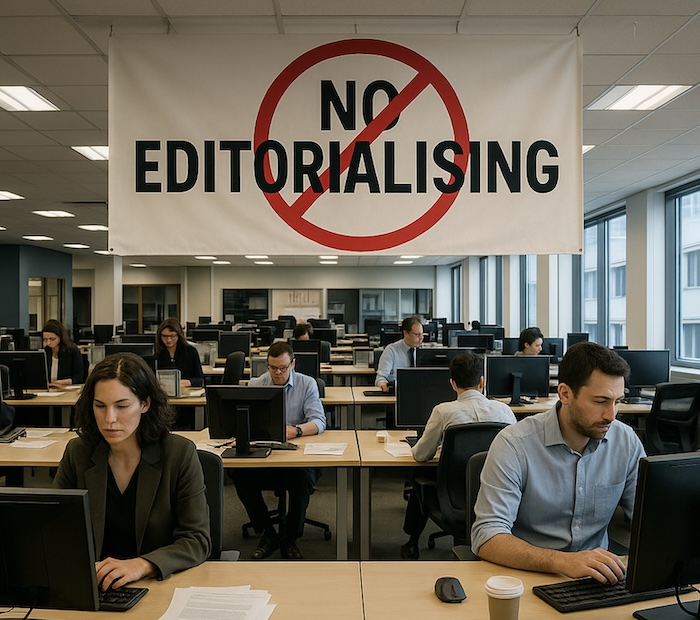 The free training materials on Media Helping Media are all aimed at encouraging one particular kind of journalism: accurate, fact-based, impartial news reporting.
The free training materials on Media Helping Media are all aimed at encouraging one particular kind of journalism: accurate, fact-based, impartial news reporting.
There are many other kinds of journalism but we believe that the single most important function is to establish and present the facts, free from any form of comment.
As the editor of The Guardian newspaper in England wrote more than 100 years ago: “Comment is free, but facts are sacred”.
Journalists need to tell people, as plainly as possible, what is happening in the world. Every story should be fact-based.
It is not enough to know your facts are correct – you must also be able to prove it. That is how we establish accuracy.
There must be zero tolerance for inaccuracy. If one element of your story is wrong, how can the audience believe the rest of it?
Sometimes the facts can only be understood with the addition of context. This too needs be fact-based and without any form of added judgement or opinion.
It is not the job of news journalism to tell people what to think. That is a matter for them – and they will be in a better position to decide, once they are in possession of the facts.
We are not interested in helping journalists use their skills to take sides, to take up causes, to become advocates. There is a place for that kind of journalism but it is not our place.
Media Helping Media trainers and contributors have their own opinions. Of course they do. But they have hundreds of years of combined experience in setting those feelings aside when reporting in the public interest. When you come to work, you leave your opinions at home.
You learn to respect facts for their own sake, however inconvenient they might be to your personal views.
You learn that like everyone else, you have conscious and unconscious biases – and these must be carefully guarded against, to stop them interfering with your reporting.
You avoid adjectives and adverbs that carry emotional or judgemental weight.
You do not editorialise. Editorialising is when you allow comment, personal opinions or bias to intrude into your story.
Above all, you allow the facts to speak for themselves.
Your immediate objective is simple but demanding: everything you write must be fact-based, strictly accurate and free from any kind of contamination.
Your long-term objective is to create trust in your work. In an age when truth itself is under attack, your best way to contribute to your society is to be a journalist who can be trusted to deal only with the facts.

Editorialising in journalism
Editorialising in journalism refers to the practice of expressing personal opinions, attitudes, or interpretations within what should be objective news reporting. According to leading dictionaries, to editorialise is “to express your opinions rather than just reporting the news or giving the facts”. In British English, the term is often used disapprovingly, especially when a journalist is expected to provide a factual account without personal bias.
The distinction between reporting and editorialising is fundamental to the integrity of journalism. News reporting is rooted in impartiality, accuracy, and the clear presentation of facts. When a journalist editorialises, they blur the line between objective reporting and subjective commentary, potentially misleading the audience and undermining public trust.
Editorialising can manifest in subtle ways – through the use of emotive language, loaded adjectives, or by framing facts in a way that suggests a particular viewpoint. For example, describing a government decision as “shocking” or “remarkable” introduces a subjective judgement that goes beyond mere reporting.
The dangers of editorialising are not simply theoretical. Audiences rely on journalists to provide information that is as free from bias as possible, enabling them to form their own opinions. When opinion creeps into news, it can erode the credibility of both individual journalists and the wider media. This is why reputable news organisations maintain a clear separation between news reporting and editorial or opinion pieces. Editorial content is usually clearly labelled, allowing readers to distinguish between fact and commentary.
Nevertheless, the temptation to editorialise is ever-present, particularly in an era of 24-hour news cycles and highly polarised public discourse. Journalists may feel under pressure to make stories more engaging or to reflect the prevailing attitudes of their audience.
However, the core principle of journalism remains: to report the facts accurately and impartially, leaving interpretation and judgement to the reader or viewer.
In summary, editorialising in journalism undermines the core values of the profession. Upholding the distinction between fact and opinion is essential for maintaining public trust and ensuring that journalism continues to serve its vital role in a democratic society.








